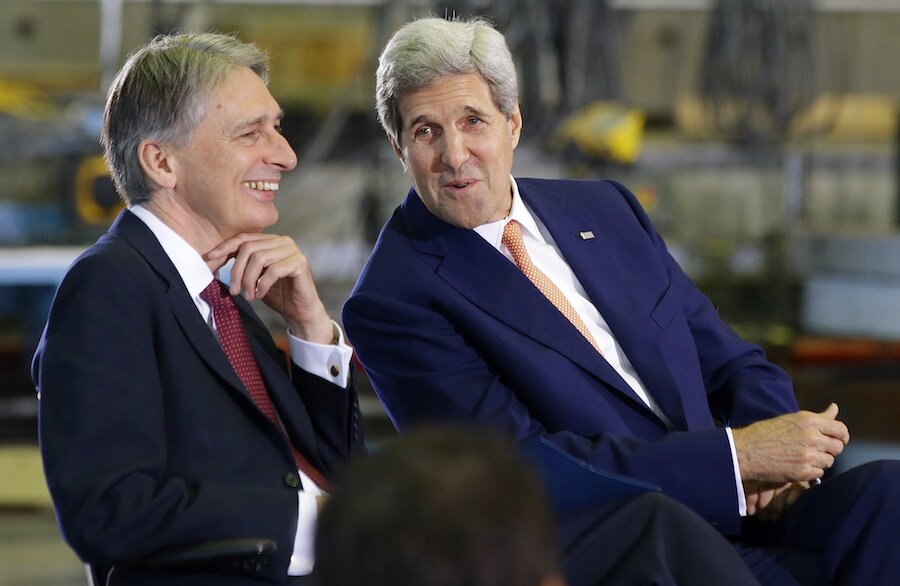Islamic State: Britain's top diplomat says endgame is regime change in Syria
| Boston
Britain's top diplomat says the US-led military campaign in Syria against Islamic State militants must be followed by regime change in Damascus, the seat of power for President Bashar al-Assad.
In an interview, Foreign Secretary Philip Hammond said Britain would help the US to stand up a proxy army in Syria that would be capable of fighting both Islamic State, also known as ISIS or ISIL, and President Assad's forces. The US Congress last month approved a spending bill to train and arm a force of moderate Syrian rebels.
Mr. Hammond says Britain, which has carried out airstrikes in Iraq against IS targets, may join the US-led bombing campaign in Syria. But he insists that the end goal of military intervention in Syria's civil war, now into its fourth year, must be the removal of Assad. And he rejects the suggestion by some former defense officials in Britain, including the former head of the army, that the West may have to make common cause with Assad against IS, as the greater threat to global security.
"In this part of the world it is not the case that my enemy’s enemy is my friend. My enemy’s enemy is somebody that I’m going to get later after I’ve got my enemy," Hammond told The Christian Science Monitor last week after a two-day visit with his US counterpart, John Kerry.
President Barack Obama asked Congress in July to authorize $500 million to train Syrian rebels. While the CIA is running a small covert program for anti-Assad fighters, the new program would provide the ground forces in Syria that military planners say are essential to destroy IS, a Sunni jihadist group. However, Pentagon officials have offered few details about the program, and say it could be several months before the first batch of fighters is vetted and ready for training in a third country, possibly Saudi Arabia or Jordan.
Hammond, who until July was Britain's defense secretary, says the goal of the US-led program is to train 15,000 "moderate" rebels in the first year. These trainees would complement the existing fighters grouped under the Free Syrian Army (FSA), which Britain estimates to number between 20,000 and 25,000. "It's not vast numbers but enough to make a significant difference to the battle on the ground," he says.
Western backers of the FSA, which was set up by Syrian military defectors, argue that it represents the most credible moderate force in the conflict. But critics have challenged the White House's ability to vet rebels and ensure that US-supplied weaponry doesn't change hands in the conflict. In northern Iraq, IS militants looted Iraqi Army bases of US equipment during its summer offensive.
Hammond argues that regular funding is key to building a cohesive rebel force in Syria. "They will be employees. We’re not talking about training a bunch of freelancers who go off on their pick-up trucks and we never see them again," he says, noting that the FSA already has organized units that draw a regular salary.
He estimates that IS fighters are paid between $300 and $600 a month, which provides a yardstick for funding a proxy army. "The wage bill for a force built up eventually to 50,000 is not going to break the bank,” he says.
Some Syrian rebels have assailed the US-led coalition for bombing IS and sparing Assad's forces, which have used the attacks on IS to redeploy its troops to other fronts. Syria's foreign ministry has stoked the controversy by claiming that the US had notified it in advance of its first airstrikes, which Washington denies.
Hammond says anti-Assad rebels need to be patient and understand that the West's first priority is to degrade IS, but that the endgame must be the removal of Assad and his inner circle. By building up a moderate rebel army, the West can ensure the balance of power “tips to the point where the sensible elements in the regime sue for a political solution to avoid what happened in Iraq, where the institutions of government were dismantled. I don’t think anyone wants to go there in Syria," he says.







